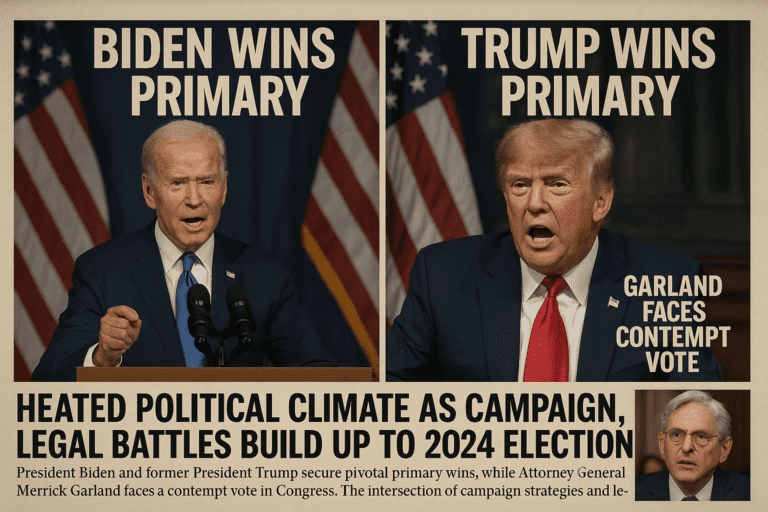The first week of June 2024 has seen significant developments on two key political fronts: President Joe Biden and former President Donald Trump have both secured major victories in their respective party primaries, while the U.S. House of Representatives has escalated partisan tensions by voting to hold Attorney General Merrick Garland in contempt. Together, these events underscore the intensifying political landscape as the country heads into the crucial months leading up to the November election.
Biden and Trump Solidify Their Frontrunner Status
As the primary season unfolds, both President Biden and former President Trump have solidified their positions as the dominant figures in their parties. Biden secured victories in a series of Democratic primaries, including those in Washington, D.C., Montana, New Jersey, New Mexico, and South Dakota. Trump, in turn, won the Republican primaries in Montana, New Jersey, and New Mexico. Notably, the South Dakota GOP primary was canceled, adding a unique twist to the otherwise expected results.
Biden’s ability to win in diverse states like New Jersey and New Mexico strengthens his campaign’s narrative of broad national appeal. His focus remains on his experience, stability, and a commitment to advancing economic progress and defending democratic institutions. Despite some pressure within the Democratic Party for a younger candidate, Biden’s strong performance in these states indicates substantial support from the party’s base, reassuring many of his path to a potential second term.
On the Republican side, Trump’s continued dominance in primaries, especially in traditionally red states like Montana and in more swing-like areas such as New Mexico, reinforces his status as the GOP frontrunner. His campaign’s rhetoric, centered on reclaiming the White House and reversing what he sees as Biden’s failed policies, continues to resonate with a large portion of the Republican electorate. With these victories, Trump appears on track for a rematch of the 2020 election, strengthening his hold on the party as it prepares for the general election.
Contempt Vote Intensifies Partisan Clashes
While the primaries dominated the headlines, a high-stakes legal and political battle erupted on Capitol Hill. The House of Representatives voted to hold Attorney General Merrick Garland in contempt of Congress over his refusal to release audio recordings from a special counsel’s investigation into President Biden’s handling of classified documents. Garland had provided written transcripts of the interviews conducted during the investigation but withheld the tapes, citing executive privilege. This decision has provoked a furious response from Republican lawmakers, who accuse Garland of obstructing transparency and preventing Congress from fully examining the Justice Department’s handling of the matter.
Though the contempt vote is largely symbolic, it highlights the deepening partisan rifts in Washington. Republicans view the release of the tapes as essential to ensuring transparency and assessing the conduct of the Justice Department, while Democrats argue that the vote is an opportunistic political move aimed at undermining the Biden administration in the run-up to the 2024 election. This clash has reignited longstanding debates over executive privilege, congressional oversight, and accountability, with legal experts suggesting that while it is unlikely to result in criminal charges, the dispute could fuel ongoing legal battles that extend well beyond the election cycle.
The Road Ahead: A Nation Divided
The developments of early June provide a snapshot of the increasingly polarized political environment heading into the final stretch before the 2024 election. As both Biden and Trump maintain their strongholds within their respective parties, the larger narrative is being shaped not only by their campaign platforms but also by the bitter institutional struggles playing out between the executive branch and Congress. With both parties preparing for their national conventions and the general election on the horizon, the race for the White House is becoming increasingly defined by entrenched partisan conflict, legal challenges, and questions about the future direction of the country.
As the summer months unfold, these tensions are expected to continue building, creating an atmosphere of uncertainty and fierce competition. Both parties are gearing up for a high-stakes showdown, with the actions of key political figures across all branches of government likely to intensify the already charged atmosphere. The stage is set for a tumultuous remainder of the election season, with a focus not just on policy but on the larger battles over power and governance.


